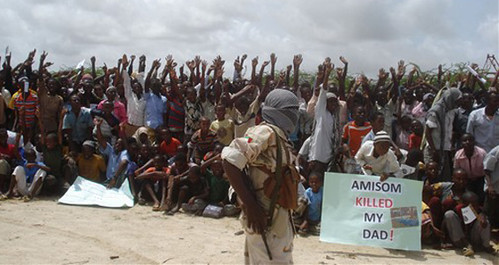
Al-Shabab rally in Somalia where the U.S.-backed Transitional Federal Government is being proped up by the western-funded AMISOM military forces composed largely of Ugandan and Burundian troops., a photo by Pan-African News Wire File Photos on Flickr.
Suicide bomber kills 4 at Somali presidential palace
Wed, Mar 14 2012
By Abdi Sheikh and Feisal Omar
MOGADISHU (Reuters) - A suicide bomber killed at least four people inside the presidential palace compound in the Somali capital Mogadishu on Wednesday, according to the police, the African Union and al Shabaab insurgents.
While al Shabaab pulled out of the capital in August and African Union forces have been securing neighborhoods vacated by the Islamist rebels, the coastal city remains prone to regular attacks by suicide bombers and roadside explosions.
Reports of the number killed by the blast differed.
Al Shabaab claimed responsibility for the attack, saying one of its suicide bombers had killed 17 people and wounded 30.
"What a victory, inside the so-called presidential palace, more explosions and bombers will follow," Sheikh Abdiasis Abu Musab, spokesman for al Shabaab's military operations, told Reuters.
Paddy Ankunda, spokesman for the African Union's AMISOM peacekeeping force in Somalia, said four people, including civilians, had been killed and that there were no AMISOM casualties.
Colonel Abdullahi Barise, police spokesman, told Reuters, five had been killed and 10 wounded by a suicide bomber.
Abdirashid Mohamed Ali, national security adviser to the prime minister, and Ankunda both said the blast was near the front gate of the presidential compound near a building used by the parliament speaker.
Since withdrawing from the capital, al Shabaab has come under increased pressure in the south and centre of the country from Kenyan and Ethiopian forces fighting alongside government soldiers and pro-government militias.
The African Union's peacekeeping force in Somalia hopes to drive al Shabaab out of these regions by August, when the U.N.-backed government's mandate expires, Uganda's top army general said on Tuesday.
The hardline Islamist group, which formally joined al Qaeda in February [ID:nL5E8D9AL5], has increasingly resorted to bomb strikes in the capital, underlining the continued insecurity in a country that has lacked strong central government since 1991.
(Additional reporting by Richard Lough in Nairobi; Editing by David Clarke and Andrew Heavens)
No comments:
Post a Comment